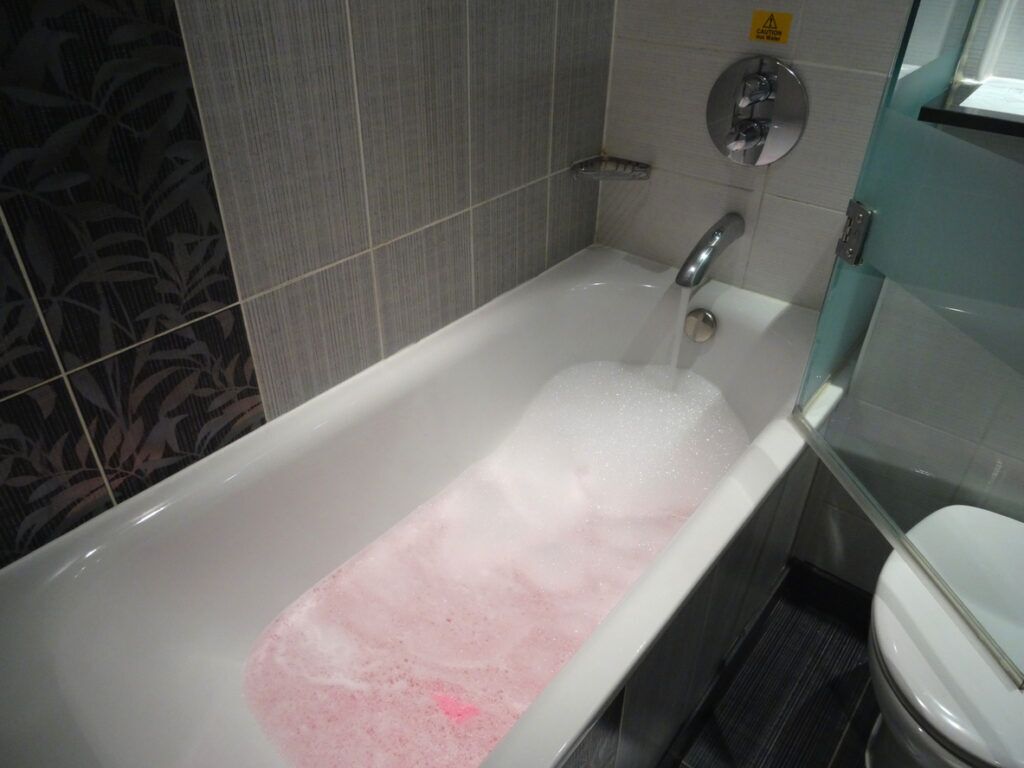Unveiling the Causes of Discharge in the Bathtub
Unveiling the Causes of Discharge in the Bathtub
Blog Article
What are your ideas regarding What to Do if Sewage Starts Coming Up Through Your Bathtub?

Sewage backup in the tub can be a traumatic and unhygienic trouble for any kind of homeowner. Not just is it troublesome, yet it additionally postures major health and wellness threats and shows underlying problems with the plumbing system. Comprehending why sewer is turning up via the tub is crucial for taking appropriate activity to deal with the issue effectively.
Intro to the Issue
Understanding the Trouble
When sewage draws back up right into the tub, it's a clear indication of a trouble with the drainage system. The wastewater that needs to be flowing away from your home is rather locating its back into your home, which can lead to substantial damage and health hazards.
Prospective Causes
Several factors can contribute to sewage back-up in the bath tub. From obstructions in the sewage system line to issues with the plumbing infrastructure, identifying the root cause is crucial for finding a remedy.
Typical Reasons for Sewer Back-up
Clogs in the Sewer Line
One of the most typical reasons for sewer back-up is a clog in the drain line. This can take place because of the build-up of debris, oil, or foreign objects in the pipelines, stopping correct circulation and creating sewer to support into your tub.
Tree Origin Invasion
Tree roots looking for wetness and nutrients can infiltrate sewer lines through small fractures or joints. Over time, these roots can grow and expand, triggering significant damage to the pipelines and causing sewage backup problems.
Aging Framework
Older homes may have obsoleted plumbing systems that are a lot more vulnerable to rust, cracks, and damage. As pipes age, they become much more vulnerable to leaks and blockages, boosting the possibility of sewer backup incidents.
Heavy Rainfall or Flooding
Throughout periods of heavy rainfall or flooding, the drain system might become overwhelmed with excess water, creating backups and overflows. This can cause sewer supporting right into bathtubs and other components inside the home.
Health And Wellness Dangers Associated with Sewer Back-up
Contamination of Water Supply
Sewage backup can infect the water supply in your home, positioning a significant wellness risk to you and your family members. Exposure to infected water can bring about stomach problems, skin infections, and other diseases.
Spread of Illness
Sewer contains damaging germs, viruses, and bloodsuckers that can create a variety of conditions, including liver disease, cholera, and gastroenteritis. Entering into contact with sewer or contaminated surfaces puts you in jeopardy of infection.
Mold Development
Wetness from sewer backup can develop perfect conditions for mold growth in your home. Mold spores can aggravate respiratory system issues and trigger allergic reactions in delicate individuals, making punctual clean-up essential.
Indicators of Sewage Backup
Foul Odors
Unpleasant odors originating from drains or fixtures, particularly in the washroom, might suggest sewage back-up concerns. These smells are often solid and consistent, signifying a problem that requires immediate focus.
Slow Draining Fixtures
Tubs, sinks, and toilets that drain slowly or otherwise whatsoever could be experiencing sewer backup. If several fixtures are impacted simultaneously, it's likely that the problem originates from a common factor, such as the major drain line.
Gurgling Noises
Strange gurgling or bubbling noises coming from drains when water is running somewhere else in your home are indicative of air caught in the plumbing system. This air buildup can result from sewage back-up and need to be explored immediately.
Immediate Actions to Take
Turning Off Water
In case of sewer backup, it's necessary to switch off the supply of water to avoid further contamination and damages. Find the main water shutoff valve in your house and shut it off until the issue can be dealt with.
Getting In Touch With a Specialist Plumber
Handling sewer back-up is not a DIY job. Contact a certified plumber with experience in managing sewage-related concerns to examine the situation and execute essential fixings or cleanups.
Preventing Contact with Contaminated Water
Up until the sewage backup is settled, stay clear of contact with contaminated water to avoid the spread of germs and virus. Wear protective equipment if you need to be in the afflicted location and wash your hands completely later.
Preventive Measures
Routine Maintenance of Sewer Lines
Arrange regular assessments and upkeep of your sewage system lines to recognize and resolve potential problems prior to they intensify right into major troubles. This can include cleaning debris, checking for tree origin invasion, and fixing any type of broken pipes.
Setting Up Backwater Shutoffs
Consider setting up backwater valves in your plumbing system to avoid sewage from flowing back right into your home throughout durations of heavy rainfall or flooding. These shutoffs instantly close when water draws back up, protecting your residential property from contamination.
Appropriate Disposal of Household Waste
Stay clear of flushing anything besides toilet tissue and human waste down the bathroom to stop obstructions and clogs in the sewage system line. Dispose of oil, oil, and various other household chemicals correctly to lessen the risk of plumbing issues.
Tidying up After Sewer Back-up
Disinfection Procedures
Completely sanitize and sanitize influenced locations after sewage backup to eliminate dangerous germs and avoid mold growth. Use ideal cleansing products and safety gear to make certain secure and reliable clean-up.
Reconstruction of Impacted Areas
Fix any kind of damages to flooring, wall surfaces, or components caused by sewer back-up. Depending on the degree of the damage, you may require to replace carpets, drywall, or other materials to recover your home to its pre-loss problem.
Sewage Coming Up Through the Bathtub?
Understanding the Plumbing System:
To understand why sewage is coming up through your bathtub, it is essential to have a basic understanding of the plumbing system. The plumbing system is a complex network of pipes, valves, fixtures, and drains that work together to provide clean water to your home and remove waste and sewage. The system consists of two parts: the supply system and the drainage system.
The supply system brings clean water to your home, while the drainage system removes wastewater from your sinks, toilets, showers, and bathtubs. The drainage system is connected to the main sewer line, which carries the wastewater to the municipal sewage treatment plant or septic tank.
Causes of Sewage Coming Up Through the Bathtub:
Sewage coming up through the bathtub can be caused by various factors. Some of the most common causes are:
Clogged Drain Pipes:
One of the most common reasons for sewage coming up through the bathtub is a clogged drain pipe. Over time, debris, hair, soap scum, and other foreign objects can accumulate in the drain pipes, leading to a blockage. This can cause the wastewater to back up and come out of the bathtub.
Main Sewer Line Blockage:
Another reason for sewage coming up through the bathtub is a blockage in the main sewer line. The main sewer line connects your home’s drainage system to the municipal sewer system. If the main sewer line gets clogged due to tree roots, grease buildup, or other obstructions, it can cause sewage to back up into your home’s plumbing fixtures, including the bathtub.
Sewage Backup:
Sewage backup is another common cause of sewage coming up through the bathtub. Sewage backup occurs when there is a problem with the municipal sewer system, such as heavy rainfall, flooding, or a malfunctioning pump. When this happens, sewage can flow back into your home’s drainage system and cause sewage backup in your plumbing fixtures, including the bathtub.
Broken or Damaged Pipes:
Finally, broken or damaged pipes can also cause sewage to come up through the bathtub. Over time, pipes can deteriorate due to age, corrosion, or external factors such as shifting soil. When pipes break or crack, wastewater can leak out and cause sewage backup in your plumbing fixtures.
Signs of Sewage Coming Up Through the Bathtub:
Some of the signs that sewage is coming up through your bathtub include:
Foul odor: If you notice a strong, unpleasant odor coming from your bathtub drain, it could be a sign of sewage backup. The smell is caused by the buildup of organic waste in the pipes. Slow drainage: If your bathtub drains slowly or not at all, it could be a sign of a clogged drain pipe or a more severe problem with the main sewer line. Gurgling sounds: If you hear gurgling sounds coming from your bathtub drain or other plumbing fixtures, it could indicate that air is trapped in the pipes due to a blockage. Prevention Measures:
The best way to prevent sewage from coming up through the bathtub is to take preventative measures. Here are some practical tips:
Regular Drain Cleaning:
Regular drain cleaning can help prevent clogs and keep your pipes in good condition. You can use a plunger, drain snake, or enzymatic drain cleaner to remove any buildup of hair, soap scum, or other debris in your bathtub drain.
Proper Waste Disposal:
Improper waste disposal can also contribute to sewage backup. Avoid flushing non-biodegradable items, such as paper towels, feminine hygiene products, or wipes down the toilet. Also, be mindful of what you pour down the drain, such as grease, oil, or coffee grounds, as they can cause clogs.
Professional Plumbing Maintenance:
Regular plumbing maintenance can help prevent plumbing emergencies, such as sewage backup. A professional plumber can inspect your pipes, identify any potential issues, and perform preventative measures, such as hydro jetting, to clean your pipes.
Hydro Jetting:
Hydro jetting is a powerful method that uses high-pressure water to clean the pipes thoroughly. It can remove even the most stubborn clogs and prevent future blockages.

I discovered that write up on Why sewage is coming up through your bathtub when doing a lookup on the internet. Enjoyed our blog entry? Please share it. Help somebody else locate it. Thank you for your time. Come back soon.
Call Today
Report this page